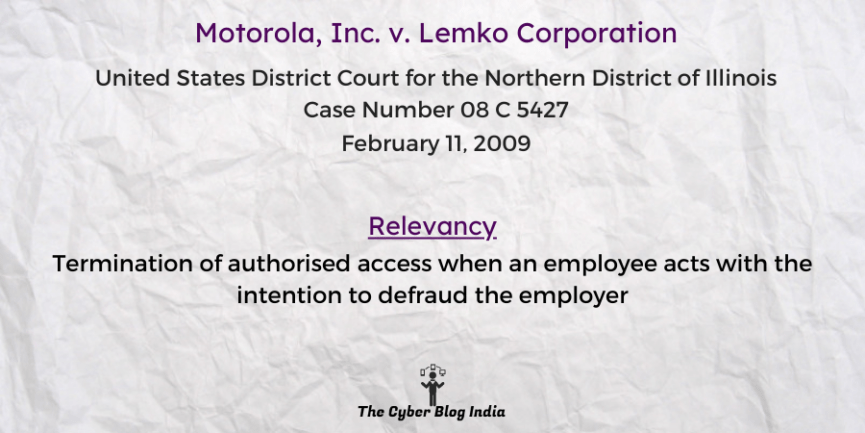Motorola, Inc. v. Lemko Corporation

Motorola, Inc. v. Lemko Corporation
609 F.Supp.2d 760
In the United States District Court for the Northern District of Illinois
Case Number 08 C 5427
Before District Judge M.F. Kennelly
Decided on February 11, 2009
Relevancy of the Case: Termination of authorised access when an employee acts with the intention to defraud the employer
Statutes and Provisions Involved
- The Computer Fraud and Abuse Act, 18 U.S.C. § 1030
- The Illinois Trade Secrets Act, 765 ILCS 1065/3 & 4
Relevant Facts of the Case
- Motorola, the plaintiff, provides communication technology and various related services. Over the years, they have developed a number of trade secrets and other confidential data in its line of business.
- The plaintiff requires its employees to sign confidentiality and employment agreements. These agreements restrict the disclosure and use of confidential information.
- In the present case, the plaintiff has sued its former employees, Jin, Wu, Bai, and Sheng, for alleged breaches of fiduciary duty. Lemko, the primary defendant, is a competitor of the plaintiff, and the former employees are co-defendants in the present case.
- All defendants, except Jin, have moved the court to dismiss the plaintiff’s claims.
Prominent Arguments by the Counsels
- The plaintiff’s counsel argued that each of the defendants violated Section 1030(a)(2), (a)(4), and (a)(5). The counsel claims a private right of action against them under Section 1030(g). He further requested the court to consider the amended provisions of CFAA.
- The defendants’ counsel argued that the plaintiff must prove both damage and loss for establishing a violation of Section 1030(a)(2). Further, the defendants had authorised access due to their employment at Motorola.
Opinion of the Bench
- The court will not apply amended provisions of CFAA as they will not have retrospective effect.
- A claim under Section 1030(a)(2) requires loss or damage, not both.
- An employee who breaches her duty of loyalty to an employer is no longer authorised to access the employer’s computers.
- The definition of damage under CFAA does not include disclosing trade secrets to a competitor.
Final Decision
- The court granted the defendants’ motion to dismiss the plaintiff’s claim for violating Section 1030(a)(2) of CFAA. For the rest of the claims, the court refused to dismiss the plaintiff’s claims.
Ojasvi Gupta, an undergraduate student at the Faculty of Law, Banaras Hindu University, prepared this case summary during her internship with The Cyber Blog India in May/June 2022.
